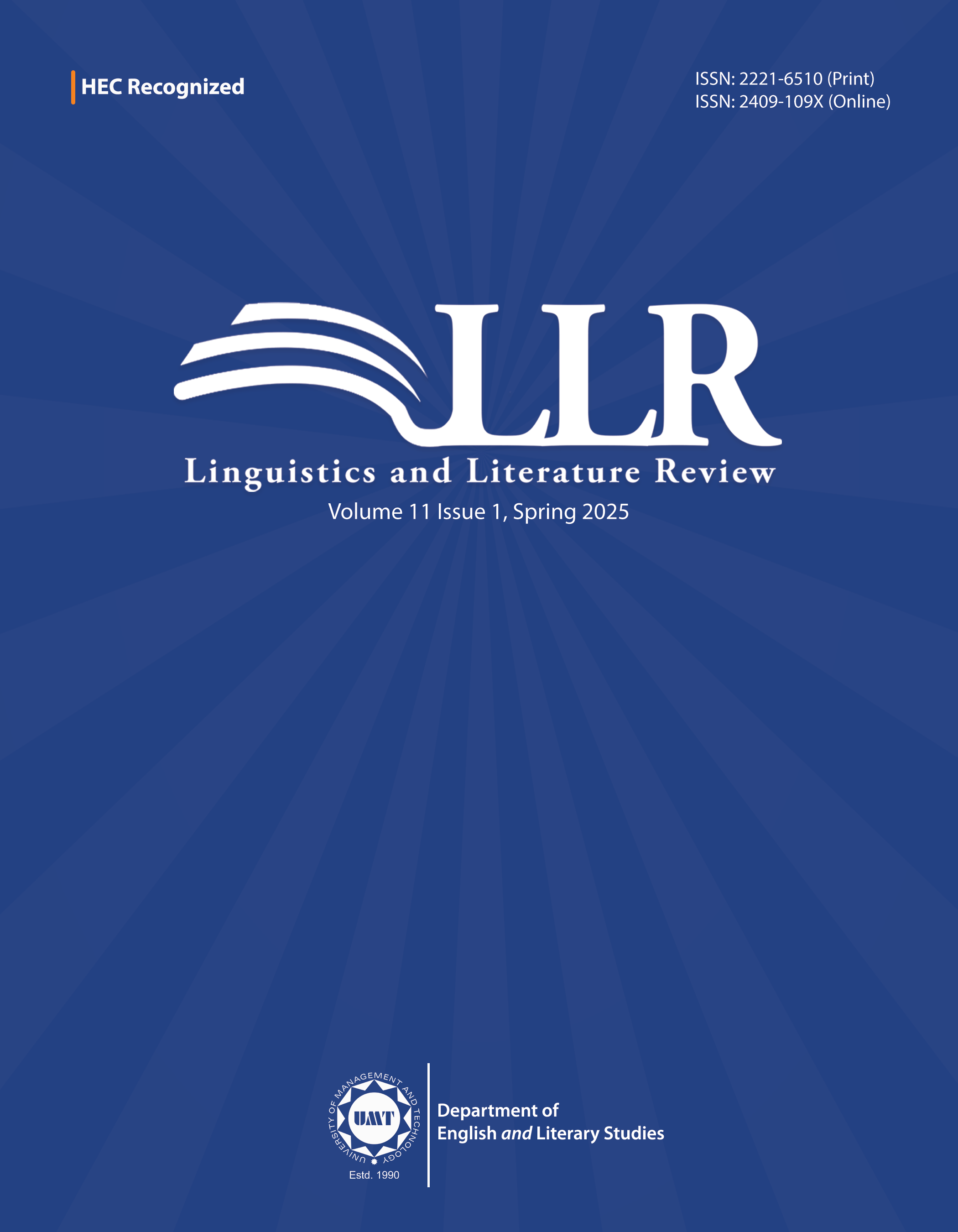Tracing the Narratives of Scapegoating: An Allportian Examination of Brick Lane
Abstract
 Abstract Views: 0
Abstract Views: 0
Brick Lane by Monica Ali centers on the themes of migration, displacement, institution of marriage, identity crises, misrepresentation and so forth. The work has been explored from these aspects but the new dimensions within this context have not been examined comprehensively. This paper aims to investigate the motif of scapegoating in the novel, which draws upon Gordon W. Allport’s conception. Scapegoating, for Allport, manifests itself in different characters that project their failures and frustrations to other people who are powerless and silenced. In its South Asian backdrop, it is blaming, killing, or scarifying a person or a group of people for personal, societal reasons or to attain certain kinds of outcomes. In case of Brick Lane, Nazneen is scapegoated by her parents when they choose Chanu, forty years old and an ugly person, as her husband. The paper will attempt to go beyond the mythological implications of scapegoating by employing it as a theoretical framework. Moreover, the question of a human being, as a modern scapegoat, in the present time will be delineated. Scapegoating functions on different levels depending upon the contexts where it is exercised. The objectives of this study are to highlight the factors enhancing the victimization by blocking the ways of empowerment. The analytical mood of inquiry will be used to conduct the research.
Downloads
References
Ali, M. (2003). Brick lane: A novel. Scribner.
Allport, G. W. (1948). ABC's of scapegoating. Anti-Defamation League of B'Nai B'R.
Allport, G. W. (1954). The nature of prejudice. Addison-Wesley Publishing Company.
Bramoullé, Y., & Morault, P. (2021). Violence against rich ethnic minorities: A theory of instrumental Scapegoating. Economica, 88(351), 724–754. https://doi.org/10.1111/ecca.12368
Brouillette, S. (2009). Literature and gentrification on Brick Lane. Criticism, 51(3), 425–449.
Campbell, C. (2012). Scapegoat: A history of blaming other people. Abrams Press.
Carmichael, C. (2000). The origin of the Scapegoat ritual. Vetus Testamentum, 50(2), 167–182.
Chakravorty, M. (2012). Brick Lane blockades: The bioculturalism of migrant domesticity. MFS Modern Fiction Studies, 58(3), 503–528.
Doubt, K. (2007). Social order without Scapegoating. Forum Bosnae, 39, 207–217.
Frazer, J. G., & Fraser, R. (1990). The golden bough: A study in magic and religion. Palgrave Macmillan.
Islam, J., & Rashid, M. H. (2022, August 26–28). Cultural hegemony in the Indian subcontinent is a barrier for women’s emancipation: An analysis of Arundhati Roy’s The God of Small Things and Monika Ali’s Brick Lane [Paper presentation]. Proceedings of the 31st International Congress on Social Sciences, Innovation and Educational Technologies, Tetovo, Republic of Macedonia.
Mishra, S. K. (2016). The colonial origins of territorial disputes in South Asia. The Journal of Territorial and Maritime Studies, 3(1), 5–23. https://www.jstor.org/stable/26664123
Norman, J. O., & Connolly, J. (2011). Mimetic theory and Scapegoating in the age of cyberbullying: The case of Phoebe Prince. Pastoral Care in Education, 29(4), 287–300. https://doi.org/10.1080/02643944.2011.626069
Palaver, W. (2003). Mimesis and scapegoating in the works of Hobbes, Rousseau, and Kant. Contagion: Journal of Violence, Mimesis, and Culture, 10(1), 126–148.
Perfect, M. (2014). Permanence and transience: Monica Ali’s Brick Lane (2003) and In the Kitchen (2009). In M. Perfect (Ed.), Contemporary fictions of multiculturalism: Diversity and the millennial London novel (pp. 115–137). Palgrave Macmillan.
Smith, M. S. (2007, June 7–10). A Woolfian reversal: The Dalloway mystique [Paper presentation]. Proceedings of the Seventeenth Annual Conference on Virginia Woolf, Oxford, Ohio, USA.
Valman, N. (2009). The east end Bildungsroman from Israel Zangwill to Monica Ali. Wasafiri, 24(1), 3–8. https://doi.org/10.1080/02690050802588968
Zumara, Z. (2020). To be ‘Muslim’or to be ‘British’⁈ An imposed negotiation of Muslim identity in Hanif Kureishi’s My Son the Fanatic (1994), Monica Ali’s Brick Lane (2003) and Kamila Shamsie’s Home Fire (2017) [Unpublished master’s thesis]. BRAC University.

This work is licensed under a Creative Commons Attribution 4.0 International License. Authors retain copyright and grant the journal right of first publication with the work simultaneously licensed under a Creative Commons Attribution (CC-BY) 4.0 License that allows others to share the work with an acknowledgment of the work’s authorship and initial publication in this journal.







